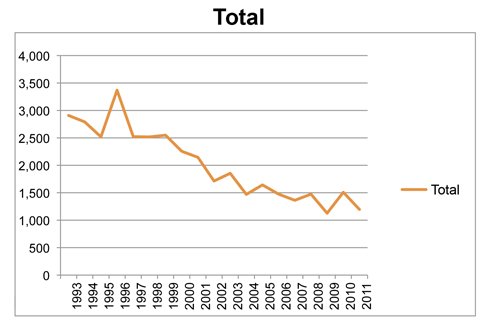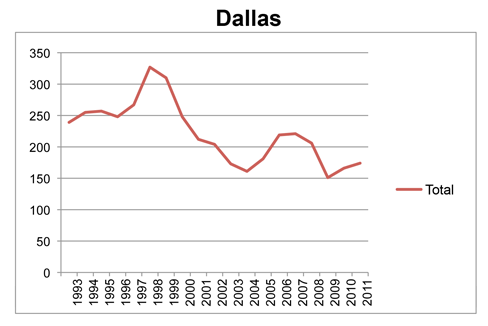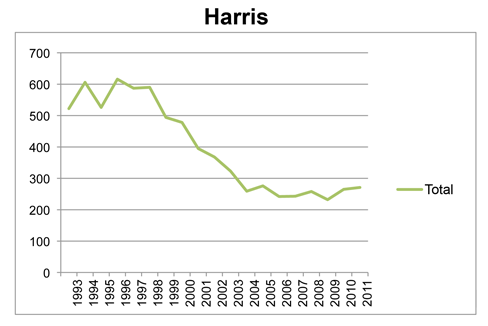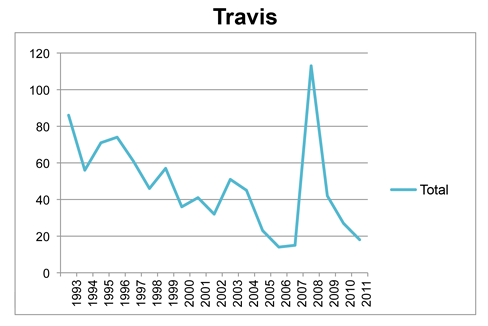By Mark Curriden
Civil jury trials are headed toward extinction in Texas, and it is happening faster than legal experts had predicted.
The right to have disputes decided by a panel of fellow citizens is cited in the Declaration of Independence and explicitly confirmed in the constitutions of Texas and the United States.
Newly released statistics show that the right to “trial by jury” is quietly and steadily being taken away or made so expensive and so onerous that individuals and even many companies can no longer have their peers judge their disputes.

The number of civil disputes in the state’s District Courts that are resolved by juries plummeted 20 percent in 2011, even as the number of lawsuits filed continued to hit record highs.
Civil jury trials have steadily declined in Texas for 15 years. The 1,195 jury trials conducted in 2011 are one-third the number held in 1996, and the second fewest since the Texas Administrative Office of Courts started keeping statewide records two decades ago.
In 1996, juries decided one out of every 48 lawsuits filed. Last year, only one in 183 new civil complaints resulted in jury verdicts.
“We are seeing our rights to trial by jury disappear before our eyes,” says prominent Houston trial lawyer David Beck.
“This attack on our civil jury system has been going on for more than a decade,” says Beck, who represents businesses in large and complex disputes. “The right to trial by jury is part of our democracy. The jury system is the people’s ability to be a check on government and the powerful.”
The trend is true in every metropolitan area across the state.
– Harris County District judges conducted 616 jury trials in 1996, but only 271 in 2011.
– Dallas County District Courts held 248 jury trials in 1996, compared to 174 last year.
– Tarrant County District Court jury trials dropped from 172 in 1996 to 106 in 2011.
– Travis County District judges presided over 74 jury trials in 1996, compared to 18 last year. (see 20 year chart below).
– District Courts in Dallas and Harris counties actually witnessed small increases in jury trials between in 2010 and 2011.
“It is very disheartening to see the demise of the civil jury system, but it is happening right in front of us,” says Mark Werbner, a prominent litigator with Sayles Werbner in Dallas.
The decline in jury trials comes as the number of lawsuits filed in the state is hitting record highs.
There were more than 220,000 complaints filed in the Texas District Courts in 2011, compared to 163,000 in 1996. As the number of new complaints during the past 15 years has jumped more than 25 percent, jury trials have fallen more than 60 percent.
The statistics do not include cases filed or tried in the state’s county-at-law courts because court officials have not collected or reported those numbers in a manner that allows accurate comparisons. However, judges and court officials say that the county-at-law courts have witnessed a similar decline in jury trials as the District Courts.

“Contrary to popular belief, the drop in jury trials in not a positive development,” says Steven McConnico, an Austin trial lawyer who represents plaintiffs and defendants in major lawsuits.
“Fewer jury trials does not mean fewer lawsuits or fewer disputes,” says McConnico, who is a partner at Scott, Douglass & McConnico.
According to state statistics, the number of jury trials in Texas District Courts fluctuated between 2,500 and 3,300 throughout the 1990s. The high was 1996, when the District Courts conducted 3,369 jury trials.
Legal experts say the state courts were hit with the trifecta.
The Texas Legislature passed significant tort reform measures, such as caps on damages, making it more difficult for plaintiffs to prevail in certain kinds of lawsuits and more difficult for plaintiffs to win large damage awards.

At the same time, the Texas Supreme Court became more pro-defense, or at least less pro-plaintiff, according to legal observers. The justices also issued a series of decisions that shifted several key legal questions previously considered questions of fact to be decided by juries, to questions of law to be decided by judges, lawyers say.
The result, according to statistics, was a dramatic increase in the number of cases decided by judges on motions to dismiss or motions for summary judgment.
In 1996, judges resolved 3,488 cases on motions for summary judgment. By 2010, that number jumped to 5,597 – a 30 percent increase.
“There are a significant number of judges who simply do not trust juries,” says Mike Lynn, a partner at Lynn Tillotson Pinker Cox in Dallas. “These judges have the opinion that regular people, also known as jurors, do not have the ability to understand the evidence or will be too emotional to decide cases.

“Too many judges think that if a case ends up in trial before a jury, that they have failed as a judge,” says Lynn. “And that is very sad.”
Adding to this attitude, lawyers say, is nothing short of a directive from the Texas appellate courts to trial judges to decide more cases prior to trial, be it on motions to dismiss, motions for summary judgment or pressuring the parties to settle.
“For the past 10 years or so, the appellate courts in Texas have made it clear that they do not respect jury verdicts,” says Werbner.
“All the lawyers know that jury verdicts will be met with great suspicion by the Texas Supreme Court and the courts of appeals,” says Werbner. “What is the result? People settle more quickly for results that are less than fully just.”
Texas Supreme Court Justice Nathan Hecht says the decline in the number of jury trials is much more complex than simply blaming decisions by the court.
Justice Hecht says the real problem is that the cost of trying a case to a jury is so expensive, due to endless discovery requests and countless demands to take useless depositions. Control the costs, he says, and jury trials will return.
To that end, Justice Hecht has advocated the passage of the new expedited trial rules for cases involving $100,000 in dispute or less. (Please See Janet Elliott’s article on this.)
Even critics of Justice Hecht agree that the cost of litigation has gotten out of control. But those lawyers point out that this is also true for non-jury trials and arbitrations, which continue to increase.
“The large law firm litigation shops have over-priced themselves so that clients cannot afford to go to trial,” says Lynn. “There are all these complaints about E-Discovery, but the technological tools are catching up and we can now search through emails and other electronic documents so much quicker and more effectively, that this is less and less of an issue. “
Lynn and others say that the costs of arbitrating large complex disputes have become just as expensive and sometimes even more expensive than litigating the case to a jury.
But lawyers and judges say there may be one additional party to blame for the decline in jury trials: lawyers.
“I think one problem is that many lawyers at many law firms no longer know how to try cases to a jury or are afraid of juries,” says Beck. “We have litigation partners at major law firms today who have never tried a case to a jury verdict. That is sad.”
To that end, Justice Hecht has advocated the passage of the new expedited trial rules for cases involving $100,000 in dispute or less. Please See Janet Elliott’s article “Expediting Trials” on this matter.
PLEASE NOTE: Content of The Texas Lawbook is controlled and protected by specific licensing agreements with our subscribers and under federal copyright laws. Any distribution of this content without the consent of The Texas Lawbook is prohibited.

Leave a Reply
You must be logged in to post a comment.